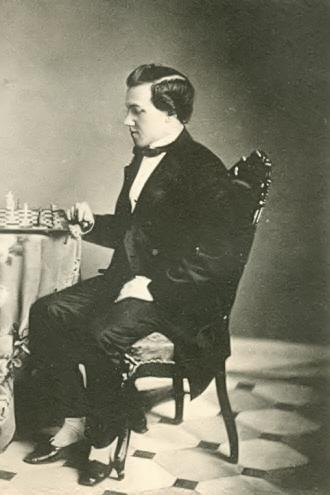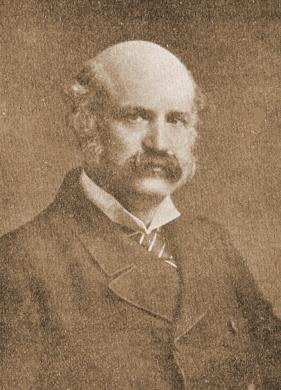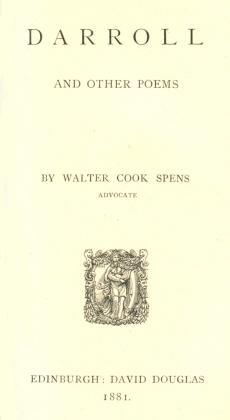
Edward Winter

Paul Charles Morphy
It is widely accepted that the description of Paul Morphy as ‘The
Pride and Sorrow of Chess’ was coined by Sheriff Walter Cook Spens
(1842-1900), but chess literature is full of matters which, while
widely accepted, are untrue. A number of C.N. items have tried to
established the facts about the sobriquet, without success so far.
On page 113 of the April 1885 International Chess Magazine Steinitz wrote:
‘... the fearful misfortune which ultimately befell “the pride and sorrow of chess”, as Sheriff Spens justly calls Morphy, can only evoke the warmest sympathy in every human breast.’
(4053)
On page 3 of the January 1885 issue of his magazine Steinitz had mentioned the phrase with a second definite article but no reference to Spens:
‘The pride and the sorrow of chess, as Morphy has been called, is gone for ever.’
(6469)
On page 144 of A History of Chess (London, 1976) H. Golombek attributed the phrase to Fiske.
(4403)
On page 308 of his Morphy book David Lawson wrote:
‘Sheriff Walter C. Spens, chess editor of the Glasgow Weekly Herald, quoted an announcement about it [a premature report of Morphy’s death] in his chess column of 25 November 1882, and added a five-stanza sonnet. It is owing to Sheriff Spens that we have “The Pride and Sorrow of Chess”.’
In fact, that edition of the newspaper (page 7) had a tribute to Morphy by Spens which was a single 14-line poem. Moreover, contrary to what might be inferred from Lawson’s words, no phrase such as ‘the pride and sorrow of chess’ appeared there.
It was in the 19 July 1884 issue of the Glasgow Weekly Herald (page 7) that Spens’ five-stanza tribute to Morphy appeared. (Lawson noted this on page 310 of his book, quoting the second stanza.) Again, though, the epithet is absent. In an endnote, Spens mentioned that his poem was adapted from previously-published material: not only the above-mentioned stanza in the 1882 Herald but also a composition ‘written about ten years ago at the time of a report as to Morphy’s insanity’ which had appeared, Spens said, in the Chess Player’s Chronicle.
We have yet to find any such poem in that periodical. However, Lawson’s book (page 409) stated that a poem by Spens about Morphy was included in the Huddersfield College Magazine at around the time in question, i.e. in the September 1875 issue. Does a reader have that text to hand?

Walter Cook Spens
Although we are focusing here on Spens’ poems, it is quite possible that ‘the pride and sorrow of chess’ appeared in his prose. Nor should it be forgotten that, as reported in C.N. 4403, Golombek stated that the phrase was coined by D.W. Fiske.
(5204)
Regarding the poem by Sheriff W.C. Spens in the September 1875 Huddersfield College Magazine, Eric Fisher (Hull, England) informs us that the composition (whose first line was ‘Problems you term the poetry of chess’) was published in the June 1875 issue, page 185. It did not mention Morphy by name, but the last two lines are an ostensible reference to him:
‘Or that Chess Byron, who, with Europe’s bays,
Recrossed the Atlantic, then withdrew from gaze?’
At the moment, therefore, we have two poems by Spens specifically about Morphy:
Glasgow Weekly Herald, 25 November 1882, page 7.
One-stanza poem, the first line being:
‘By the bright winter fire I lightly read’.
Glasgow Weekly Herald, 19 July 1884, page 7.
Five-stanza poem, the first lines of the respective stanzas being:
‘He came to Europe: English sages smiled’
‘He played a glorious game: in open field’
‘About him was a gentle modesty’
‘He came, he saw, he conquered; then he went’
‘So o’er his clouded mind the sad years sped’.
As mentioned in C.N. 5204, the latter issue of the Herald had an endnote by Spens:
‘... There is something at once very sad and striking about Morphy’s career. The four first sonnets, which we subjoin (slightly altered) – written about ten years ago at the time of a report as to Morphy’s insanity – appeared in the Chess Player’s Chronicle, and have since been published in different chess publications. The fifth sonnet is substantially rewritten, but some of the lines appeared in a sonnet which was written at the time there was a report as to Morphy’s death in the autumn of 1882. W.C.S.’
(5223)
Matthew O’Hara (Arvada, CO, USA) draws attention to a webpage regarding The Pride and the Sorrow (‘a novel about Paul Morphy’).
The author, Matt Fullerty (Washington, DC, USA), informs us that he hopes to have his book published in the summer of 2008.
(5240)
As previously noted, the phrase is absent from the two poems about Morphy which Walter Cook Spens (1842-1900) published in the Glasgow Weekly Herald: 25 November 1882, page 7 (one stanza) and 19 July 1884, page 7 (five stanzas). C.N. 5223 discussed the complexities surrounding the latter work, which, we now add, was also published on pages 225-229 of Spens’ anthology Darroll and Other Poems (Edinburgh, 1881).

The ‘Chess Trifles’ section of the book comprised the following:
Page 223: a poem indirectly referring to Morphy which had been published on page 185 of the June 1875 issue of the Huddersfield College Magazine (see C.N. 5223).
Page 224: a quotation from Figaro reporting that Morphy ‘is confined to a lunatic asylum in New Orleans’, followed by a passage from the Glasgow Weekly Herald stating that according to American exchanges ‘the report of Mr Morphy’s insanity is entirely without foundation’.
Pages 225-229: the five-stanza poem mentioned above. The fifth stanza related that the reports about Morphy were false, and it thus differs from the version published in the Glasgow Weekly Herald some three years later.
Pages 230-232: ‘Chess Song’, a verse parody by Spens, assisted by ‘the late Dr Frazer of Edinburgh, a well-known chessplayer of more than local celebrity’. The composition contains such passages as:
‘An’ lo! the bonnie Queen as well,
Worth twa big Rooks – ay, a’ that,
A wee bit chancy pawn may sell
An’ trip her up for a’ that.’
Pages 233-236: a prose account of a match played in 1881 between the West of Scotland and the East, followed by a poem on the event, entitled ‘The West Victory’.
Concerning the phrase ‘the pride and sorrow of chess’, we are thus as far as ever from tracing the original source.
(5735)
From the Glasgow Weekly Herald, 18 December 1875, page 7:
‘Mr Morphy. With the deepest regret we learn from the American papers that Mr Paul Morphy, the world-renowned chessplayer, is hopelessly insane, and is confined in a lunatic asylum at New Orleans. If this intelligence be exact – and there is but too much reason to fear that it is – Mr Morphy’s chess career must be looked upon as closed. The loss is irreparable. His was the finest genius for the game that ever existed; and had his faculties been spared, he might have done more for the promotion of chess than any other living player – Figaro.’
The following week (25 December 1875, page 7) the Herald reported:
‘The Chess Player’s Chronicle for January will contain a poem on Paul Morphy, specially written for that magazine by Sheriff Spens of Hamilton. Our American exchanges, just to hand, inform us that the report of Mr Morphy’s insanity is entirely without foundation.’
The five-stanza poem was published on pages 4-6 of the January 1876 Chronicle. With the exception of the fifth stanza it corresponded to the above-mentioned poem on page 7 of the Glasgow Weekly Herald, 19 July 1884. The Herald published the Chronicle’s version on page 7 of its 22 January 1876 issue.
To summarize, the origins of the ‘pride and sorrow’ phrase have yet to be traced. At present, it cannot even be said with certainty that Spens was its originator.
Apish ‘tributes’ to Bobby Fischer on page 21 of Chess Life, March 2008:
‘He was the pride and sorrow of chess.’ (Raymond Keene)
‘Chess was his native tongue.’ (Larry Evans).
(11059)
With the increase in digitized publications it can be hoped that more nineteenth-century occurrences will be found of ‘The Pride and Sorrow of Chess’. At present the earliest citations that we have given are:
C.N. 4053:
On page 113 of the April 1885 International Chess Magazine Steinitz wrote:
‘... the fearful misfortune which ultimately befell “the pride and sorrow of chess”, as Sheriff Spens justly calls Morphy, can only evoke the warmest sympathy in every human breast.’
C.N. 6469:
On page 3 of the January 1885 issue of his magazine Steinitz had mentioned the phrase with a second definite article but no reference to Spens:
‘The pride and the sorrow of chess, as Morphy has been called, is gone for ever.’
(12001)
See too Paul Morphy.
To the Chess Notes main page.
To the Archives for other feature articles.
Copyright: Edward Winter. All rights reserved.